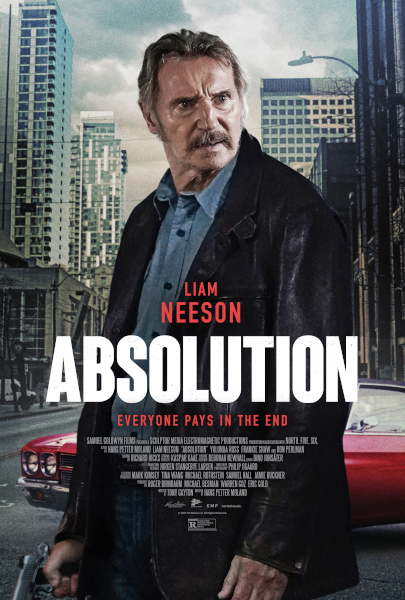Eye For Film >> Movies >> Absolution (2024) Film Review
Absolution
Reviewed by: Jennie Kermode

People who take up careers in violent crime rarely expect to get old. When they do, well, unless they’ve made it to the very top of the heap then there are not many options for moving into a desk job. Admittedly, roles change. The nameless protagonist of this tale, played by Liam Neeson, now serves as minder to Kyle (Daniel Diemer), the ambitious but somewhat clueless son of his boss Mr Conner (Ron Perlman). He’s largely there to advise the kid, and succeeds in keeping him out of a few scrapes, but even Kyle notices that there’s something wrong with him.
In the opening scene, we see Neeson’s character parking his car in a seaside street and making his way up to his meagrely furnished apartment. As he does so, he reflects – in voiceover form – on how his father made him fight another kid when he was young, obliging him to prove his manliness. This memory seems clear as day to him. More recent memories, however, are not. In response to a doctor’s enquiry, he relates that the first time he was hit in the head was at about the age of six. A career as a boxer followed. He doesn’t mention the crime; in the grand scheme of things, that’s just another detail. When his tests come back, educated viewers will not be surprised to learn that he’s suffering from chronic traumatic encephalopathy. He has, he told, perhaps two years before he will cease to be able to take care of himself, but the disease could progress much more quickly.

He flirts, briefly, with the idea of suicide. In an unintentionally comedic moment, he sits in his car holding a gun only to have another car pull up next to him, a wee girl smiling at him through the window as if he were Batman trying to get rid of a bomb. He tries to reconnect with his son, which turns out to be a non-starter, and then with his daughter, now a parent of two herself, who is not at all keen to let him and his temper and his drink problem back into her life. In a bar one night, he meets a woman with problems of her own (Yolanda Ross, easily the best thing in the film) and the two embark on a messy but comforting relationship, informed by their mutual expectations of failure. In the meantime, however, his working life is disintegrating, and that’s before it emerges that somebody out there wants him dead.
Neeson does his best to bring something different to the character, to make it more than just a retread of his work in Martin Campbell’s Memory, but he’s up against it. in his scenes with Perlman, who wears a pale grey suit and lives in a nice suburban house, we get a flavour of a past when both men thought they were going somewhere, a hint of how their paths diverged. This is a man who understands that he is responsible for his own fate. He may even understand, in a subplot about human trafficking which recalls the kinetic but problematic Taken, that his foreshortened redemption arc is an attempt to save himself rather than anyone else. Still, the depth of Neeson’s portrayal is not sufficient to carry the film on its own, and its other elements feel themselves like dim memories of several of the actor’s previous works.
Neeson partnered well with director Hans Petter Moland in 2019 film Cold Pursuit, but here the Norwegian director’s artistic ambitions get in the way of what might, if pared down, have been a more effective piece of work. Dream sequences in which the protagonist reconnects with his abusive father, who seems to be trying to repair their relationship, feel too out of place, a necessary tonal difference widening into a gulf. Neeson may have benefitted from more opportunity to express his character’s internality through his craft, but perhaps that’s another downside of going into crime – that people are apt to forget one’s other skills. The result, here, is a film that drifts by rather like the life we can see nearing its end – adventurous in places, if not all that unusual; interspersed with bouts of action, certainly; but not likely to be long remembered.
Reviewed on: 01 Nov 2024

















